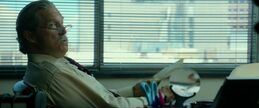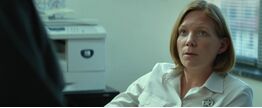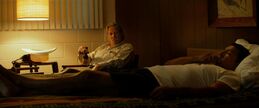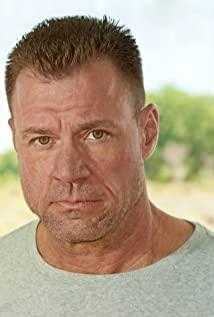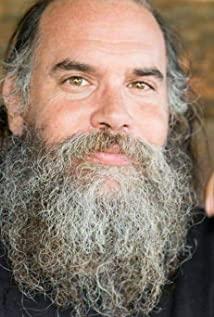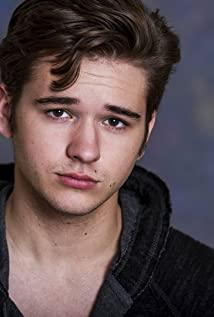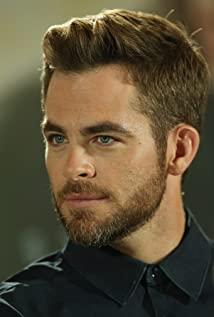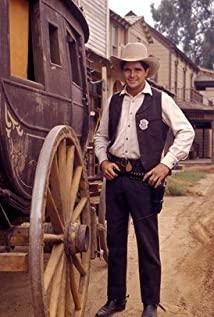This is a standard American contemporary western movie.
The Texas prairie, the skinny cowboys, the mixed-race troopers, the endless highways, coupled with the strong country music, straightforward and witty dialogue, everything is very western. If your viewing experience has a soft spot for this kind of long-shot opening story, you will fall in love with this movie in the first three minutes, and will not let it go until the end.
Because of the inability to repay the loan, the farm is about to be reasonably occupied by the bank in a way of "robbery". Moreover, the farm has discovered that it can produce more oil per month than the total loan amount. How can I get back from the arrogant bank that my mother left it to me? own farm? The Cowboy brothers Turner and Toby, who are Texans, chose to rob a bank to repay the money, and let the robbed bank be the trust of their farm, which seems to be a move in our traditional martial arts: using force to fight. Toby's attorney described it as "the Texan way of doing things."
If the story uses two bank robbery cowboys as the protagonists, and the robbery is successful, then a balance must be struck in the narrative, otherwise, the story will become an incorrect praise and agitation. After all, robbery is illegal. Therefore, in order to balance the narrative and make up for the natural "deficiencies" in its values, the film makes up for it from three aspects:
One is the greed that shapes banks. The film mainly uses a roundabout way to use the supporting characters in the film to quietly exaggerate the greed of the bank, so that the audience can have a better understanding of the robbery behavior of the brothers. Once when the old police detective Marcus asked witnesses, one witness said: "The bank that robbed me for 30 years was robbed." For the audience, this poignant taunt had the purpose of "inflaming the flames". Close the distance between the viewer and the protagonist. Another time, the old detective's partner, the Indian-Mexican Albert, squatting outside the brothers' bank, said: "150 years ago, this was the land of my ancestors, all the places you saw, and All the places I saw yesterday, until they were taken by the ancestors of these people. But now their land will be taken too, only not by the army, but by those idiots in the bank." Again It is Toby's bank. When Toby asked him why he did this business, the lawyer said: "The arrogance of the bank makes me disgusted." With the "help" of the public, the police, and lawyers, the role played by the bank in this film Automatically classified as a "villain", the first level of balance in the story has been established, followed by the second level of balance.
The second is the brotherhood between Turner and Toby. Neither of them were villains, and Toby repeatedly reminded Turner to be gentle with the bank teller. Although the two robbed at gunpoint, shooting to kill was not in their plan. Toby just wants to grab enough money to pay off the bank loan, keep the farm, and don't want the poverty to spread to his children. And Turner, who was released from prison for a year, agreed only because of his younger brother. The two had this conversation in the restaurant:
Turner: Maybe we should rob another bank.
Toby: You talk like we can't get away.
Turner: I've never seen someone who did something bad without being punished, how about you?
Toby: (silence for a moment) Then why did you agree to do it together.
Turner: Because you asked me to help, brother.
Turner learned that his brother had not seen his child for more than a year, and suggested that he go to see the child tomorrow, while Toby was embarrassed to go because he owed alimony to his ex-wife, and this was the conversation between the brothers. Turner's line "I've never seen someone who has done something bad without being punished" is profound, both pointing to his own past and implying future outcomes. In the film, Special was imprisoned because he "manslaughtered" his father, and the so-called "manslaughter" was to resist his father's brutal beating. Compared with the forbearance of his younger brother and mother, Turner did not endure it any longer. He shot, This is a punishment for his father's wrongdoing to the family, and he was imprisoned without his mother's forgiveness from beginning to end, and it was also a punishment for himself. At the same time, this sentence also paved the way for Turner's final ending. After all, it was a bank robbery, so at least one of the brothers had to die. Since Turner had to die, he had to make his mistakes so hard that the viewer could distinguish him from his younger brother. So, in robbing the last bank, Turner not only killed two innocent people, but also shot and killed the mixed-race police detective Albert, who had a large family to support, and was finally shot in the head by the police detective Marcus.
Turner may have foreseen his fate from the beginning, so he chose to save his brother with his own life. At the fork of the road, one is the road of escape and the other is the road of death. Turner chooses the road to death, going to the roaring police car, as the last cover for his brother. When they parted, the brothers had this conversation:
Turner: This is your plan and it worked, every step of the way is in your design, believe it.
Toby: Where are you going? (The brothers are silent) Don't be silly.
Turner: (turns head to the other side) I love you, Toby (turns to Toby) Sincerely
Toby: I love you too
Turner: Toby, go to hell
Toby: You're going to die too
By telling Toby to "believe it," Turner was telling Toby that you can do it, even without me. The implication is that I decided to die, and you will be alone in the future. In the days without me, you have to take care of yourself. This is actually a dying confession. Before, Turner asked Toby if his mother had mentioned him before she died, Toby did not answer. At that moment, Turner looked into the distance, and his heart was undoubtedly bitter. And the command to Toby at this moment is the expression of the mother he once fantasized about himself. Deep in this expression is the infinite desire for family affection, and the infinite expectation of the family from a heart that has never been safe. Without his parents, Turner's only concern is Toby. At this moment, he is the dying mother lying on the hospital bed, which adds an extension of maternal love to the brotherhood. Perhaps that's why Turner chose to join his brother's bank robbery plan without hesitation.
The third is an open ending. Retired Marcus came to Toby's farm and stood opposite Toby with a shotgun. Marcus told Toby straight to the point that he shot his brother himself. The dialogue between the two is tense with tit-for-tat in great restraint, like a shotgun that can fire bullets at any time. At that moment, it seemed to return to the classic drawn gun duel scene in Easter Clintwood movies. , but this scene does not appear in the film.
Because of the previous scene where Turner was shot from a distance, we had no doubts about Marcus's marksmanship, he could shoot whenever he wanted, but he didn't. There is this conversation between the two:
Marcus: My partner has family, a big family, and they don't have an oil well in their yard.
Toby: I didn't kill your friend
Marcus: It's you, because it's the case you planned
Toby: I've been poor all my life, and it's like a disease, passed on from generation to generation, but my sons don't, never again.
This dialogue is essentially the same as what Turner and Toby said when they finally parted. Toby said that his children would no longer live in poverty like himself. The implication is that he can go and make a break with Marcus now. One is for his brother and the other is for his partner. The hearts of the two are in each other. On the body, now that they are no longer concerned about each other, it is time to end. So, when Marcus was about to leave, Toby told him that he had rented a house in town and that he was welcome to finish the conversation if he wanted to. Marcus said indifferently, that's fine. The unfinished words are the duel, but who will win in the end, the director did not tell us, every viewer has the answer in their hearts. Maybe the director wanted Toby to win, but he didn't want Marcus to die, and he couldn't let Marcus die. Toby never fires a gun in the movie, though he bluntly says that if Marcus wants to be the first, let's do it. Marcus naturally didn't do it, not because he was afraid of Toby, but wanted to make Toby plead guilty in another way, such as the law. I guess that the death of Marcusti Albert may be to make Toby feel guilty, and to strive for some vested interests for Albert through his own efforts, such as material compensation, after all, life has to go on.
View more about Hell or High Water reviews



